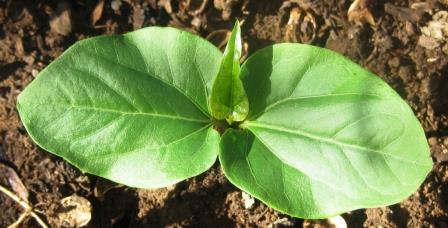 The Jatropha Curcas, also known as 'danti', is a strange species of flora. It's leafy and green - sometimes it takes the form of a shrub, but it can also become a tree up to six meters tall. It came from the tropics of Central America and can thrive in semi-arid climates with low-nutrient soil. Jatropha plants bear a poisonous little fruit - inside each are several black seeds. If you crush them, you get oil.
The Jatropha Curcas, also known as 'danti', is a strange species of flora. It's leafy and green - sometimes it takes the form of a shrub, but it can also become a tree up to six meters tall. It came from the tropics of Central America and can thrive in semi-arid climates with low-nutrient soil. Jatropha plants bear a poisonous little fruit - inside each are several black seeds. If you crush them, you get oil.
Around 2008, there was a lot of noise over this miraculous plant. The seeds were found to contain 27-40% oil that can be processed to produce a high-quality bio-diesel fuel, usable in a standard diesel engine. It was believed that the plant grows well on wasteland and needs little attention and water. In India too, it was seen as a good source of bio-diesel, and the government had identified 400,000 square kilometers of wasteland – out of the 600,000 sq km of wasteland in the country – as suitable for cultivating it. Businesses started seeing its cultivation as a worthwhile investment opportunity, and it was expected to help thousands of the rural people. The government was hoping that by 2011 bio-diesel from Jatropha will replace 20 per cent of the diesel used in the country, which would be a fairly substantial figure.
But unfortunately, that wasn't the case.
Jatropha could indeed thrive in unforgiving environments - but its fruits and seeds simply weren't productive where the soil was poor. To produce enough oil to be economically viable, Jatropha plants did require arable land and would have to compete with crops and forests. The oil lobbyists jumped in the discussion, who mounted a huge worldwide campaign against alternative fuels. The frightening argument they made was that large-scale cultivation of these plants will lead to an increase in global warming as farmers, particularly in third world countries, will cut down forests to grow these more profitable plants. This was a clever but false argument. Small farmers hardly amount to forest depletion. Deforestation is carried out by large companies, as in the case in Indonesia and Brazil. The oil lobbies conveniently choose to ignore that.
The discussion - after garnering some media limelight - ceased. Except of-course a few countries which continue to see this as a viable option to the growing energy crisis.
The fact remains, that growing plants such as Jatropha will mean growing 'plants'. If the cultivation of these plants can be carried out under some control, it will actually help reduce the toxic effects of petroleum and diesel. Recently, it has been discovered that Jatropha has great environmental potential as well. Their leaves absorb high amounts of carbon dioxide. In-fact, a single hectare of Jatropha plants can capture between 17 and 25 metric tons of carbon dioxide annually. The concept is often termed as carbon farming. The end costs involved are so low, that Jatropha carbon farming have proven to be a viable alternative to the more high-tech methods in practice.
More research and work has to happen in this field. Even if the idea of Jatropha as the future fuel fails, it is important such efforts continue. There is a dire need to acknowledge, identify on an emergency basis, and implement biofuels which can act as substitutes for petroleum. 50% of the vehicles in Brazil run on ethanol or a mixture of ethanol and petroleum called “gasohol”. It is well known that ethanol from sugarcane or switchgrass is an excellent substitute, but somehow not much research is happening in this area. It's high time we remember that Henry Ford designed and built his Model car to run on ethanol not petroleum.
